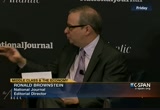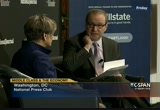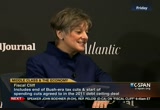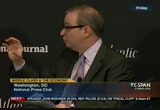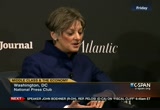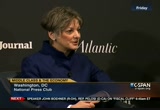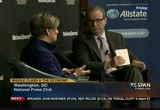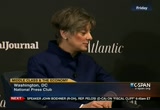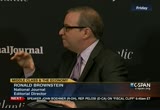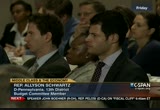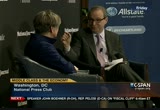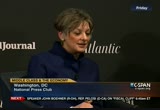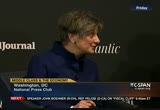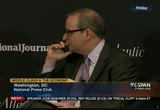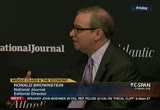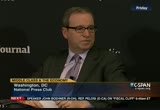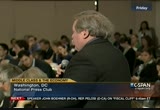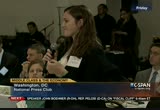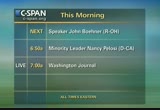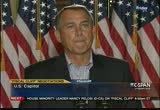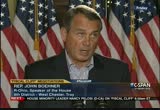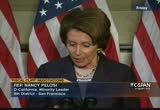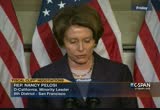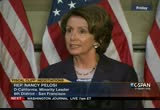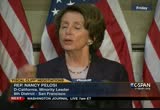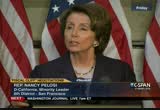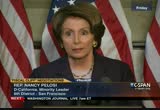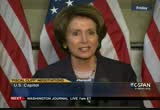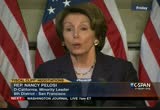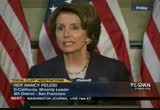tv Politics Public Policy Today CSPAN December 8, 2012 6:00am-7:00am EST
6:00 am
i want to have a conversation in two parts that reflects the dual nature of the to do list the public presented in the poll. on the one hand, when you ask them the most immediate challenge for washington to face, they do talk about the deficit and the debt in getting the fiscal house in order. that is not the full extent of the list. but behind different as we talk about priorities along partisan and racial lines. let's start with where we are and with the public has been pounded with this message week after we, on the question of resolving the immediate fiscal cliff. how would you describe your temperature, your feeling that there will be some kind of
6:01 am
accommodation and a deal even on the tax and spending and sequester side or both? >> good morning. glad to be with you and give you my perspective on where we are. to the beginning of your question, i often say one i am giving remarks that -- people in the same group, no matter how ponce and they are, people -- no matter how partis and they are, people will say two things. i want you to go to washington and stand on your principal. i want you to fight for us. i say, i will. someone else will get up and say, i want you to compromise
6:02 am
and find the middle ground and get things done. this is the 10th time this just happen to me. i say, that is exactly what they hired me to do, to figure out how we do both of those things. it is our job as representatives in congress, to fight for our values and the principles we believe in and still can something done. that is where we are right now. the divide we are facing right now -- i hope all parties understand we have serious challenges. we have created a moment in time with there are major fiscal and tax policies facing us at the end of the year. we need to make some decisions about how we are going to move forward. the democratic position on this is pretty clear. the president could not be more clear 3 the election.
6:03 am
elections data. we -- the president could not have been more clear during the election. we picked up seats. we are willing to do spending cuts. how we do that should be discussed. we need some of the revenues. there is no laugh that at up that gets us to dealing with the deficit and potentially paying down the debt and putting ourselves on a sustainable path going forward. we should do all those things and we should face them. we have been challenges going forward. it is a difference of opinion between republicans and democrats about how we get there. >> the administration absolutely was willing to let the entire tax cut expire rather than agree to anything that would extend the bush era tax
6:04 am
rates. does the house have a position -- to the house democrats have a position on that? is that a uniform position? >> we are with the president on where we stand on this. we think the revenue from the top 2% is a marginal rates. every american is going to get a tax break on the first $250,000 of their income. there is a benefit to all americans. we are not asking that much in this context from our wealthiest 2% of americans. we are not asking 10%, 20 versus sun, 40%. it does not solve the would- 10%, 40% -- 10%, 20%, 40%.
6:05 am
it is not too much to ask. we could see the economy and americans with some certainty. >> do you think the economy stays or goes down in little bits? do you believe the economy could withstand the effects of allowing the bush tax cuts to expire for all americans, even temporarily? >> that is not all of the discussion. the fiscal cliff would affect 27 million american families. there are other parts of this.
6:06 am
when you hear about the fiscal cliff, it is not really the tax rate. i do not buy that at all. i do not think we need to increase these tax rates. >> if you go over and the tax rates go up on everyone and all that goes away -- >> i do not think we should do it. i think we should resolve this. it depends on if we do something about it in the next month or two after that. if we do something in 30 days or 90 days and we are clear about that, but nothing people believe we are going to do something until we do it. >> the to go to the broader concern. does the top rate have to end the 39.6% the way it was under bill clinton? could be democrats accept something between if it was
6:07 am
coupled with a reduction in the ability on the top 2% to except a reduction of deductions? >> i do not want to second-guess what we might decide. i do not think that is what we should debate the right now. multimillionaires and what deductions they can take is something different. this is where we are. >> that is in addition to. >> yes, in addition to. the problem with having that debate now suggests that that is all we have to do is find that a hundred dollars billion, and we are done. -- find that $8 billion dollars and we are done. we get it from spending cuts
6:08 am
shia we believe there needs to be revenue coming in. there have to be investments for economic competitiveness and economic growth. this is not just rhetoric. it is how we do tax policy. which is how we make investments and how we deal with those families in the video worried about debt and higher education and retirement. >> on the tax side, as part of the adults of a solution, to you think the gap between the way work is tax and investment and capital gains are taxed -- does that have to narrow as part of the final solution? >> i think so. capital gains going up 20%, some people suggest even more. that is something we should look at. there is concern about that.
6:09 am
the differential is one of the reasons why will the americans pay so little. ann romney be one of them. it is not really fair. he thought it was -- mitt romney being one of the imperious -- to being one of them. >> on the other side of the leisure, they never released a math and with a scribbled all of the house -- on the other side of the ledger him, they never released a nafta and where they scribbled on of the ideas. we have had an election. shut those two ideas still be on the table the that the president -- should those two
6:10 am
idea still be on the table when the president and the speaker are in the room together? >> it doesn't have to be done right now. it is not as much risk. we should deal with it and we should. when it comes to medicare and medicaid and health care spending general, i think we start on medicare and make sure we are committed to medicare and the promise we have made to our seniors -- not just current seniors, but future seniors. is really is something we start with, to keep its universal and to keep benefits. once he makes the decision where we are not going to shift costs to individuals the we have to focus on containing the rate of growth in costs medicare is a way to do that.
6:11 am
for private companies and individuals, it makes a difference as well. we are trying to do that, implementing thea aca. i feel strongly of rewarding doctors differently, in a way that rewards success. in those discussions, are there other ways we can see revenues come in from within the health- care system? i think that is on the table. i am not keen on raising the age for medicare. we have to help figure out how to a group of people figure out how to get health college. that is the cost of subsidies. do they go into the exchange.
6:12 am
for medicare, the use of the least expensive seniors we have, 65 and 66 year olds. the most expensive seniors are much older. you have to look at the consequences and whether that is a cost savings at the end of each day for government and for families. >> one final question on the immediate and we will go back to the broader agenda. the president had a firm statement this week about the test ceiling where he says, i will not play that game, meaning he will not negotiate for raising the debt ceiling. how was that going to work? does that need to be part of any agreement to appoint -- agreement to avoid the fiscal
6:13 am
cliff? >> this is serious fiscal and tax policy. it is about the economic future of our country and making sure this country continues to be the greatest economy and the greatest country in the world. it is not a game. i am with the president on this one. we saw the response of the market in august with the republicans were willing to go off of the fiscal cliff. some of them are saying it now, not paying on our debt and jeopardize the full faith and credit of the united states. this is not a game. if we do not pay our bills and pay our debt, we are going to see interest rates going up. it is not where you make the decision about spending and the budget. you have already made those decisions. this is just about paying the bills. he gets is serious in this country. we have to get the deficit under
6:14 am
control and begin to pay down the that feed -- pay down the debt. the last thing we want to do to what is an economic recovery, but a fragile one, we cannot go back to threatening consumer investments for having the government failed to meet one of the basic obligations, which is to pay our bills. >> let me ask you about your view on the impact. if you are able to reach an agreement to avoid the fiscal cliff and to set up a process that would produce the $4 trillion, how good you think that would be for the economy gemology think it would matter much in accelerating growth? >> i think it would. it would come back to the economic philosophy that we can
6:15 am
lower tax rates for the rich and we will be fine. we have to make tough choices for now and for the future. getting those spending cuts on the table, how do we do that in a way that is agreed to and we can get it done. and that we do raise revenues that are hard dollars now and making investments that will ensure economic competitiveness in the future. we need to honor of the commitment to our seniors and retirees. it is a message to americans and individuals the government can function and make tough decisions and we can make decisions that will benefit the middle class. that is what made our country great. of the people you heard from in that poll said, we are great americans. we need our government to be helping us.
6:16 am
if we want to be innovative and entrepreneurial, if not -- it does not just happen. it comes from the investments we make in education and the way we do our tax policy and incentivizing energy and innovation in manufacturing. there are tax deductions we can get rid of. they are old and we do not mean them. it is important to the investment community. we know there are a lot of companies that are sitting on millions of dollars, billions of dollars, waiting for the right moments. if we want them to start spending in, we better make some hard decisions. we need to give them some certainty. you mentioned when the debt ceiling tucks happens before the republicans -- he mentioned with
6:17 am
the debt ceiling talks happened before. we have to reach some agreement. we have to do it for the long term as well as the short term. >> you are doing an exemplary job. when we polled people about what is the to do list for washington, the debt was number one. the availability of good paying jobs, the social security system. what of the actions we could take that would have the biggest payoff for the next 10 or 20 years? eliminating the deficit write only fifth. people think other things are more important -- the education
6:18 am
system, promoting manufacturing and the education -- the manufacturing system. how does that have to be structure in a way that will put us in the position to deal with the other concerns that people have? >> how do we make those cuts? the president is clear about this. we should not cut access to higher education. in my own state, we have seen cutting of higher education. how is that going to help pennsylvania's and all americans have access to jobs. pennsylvania -- pennsylvanians and all americans have access to jobs? basic education is our role for the poorest children in this country.
6:19 am
in my own district, we have lots of good schools the are struggling. the wealthiest school districts rely on the federal government to help them. access to higher education. there are families in my district who are earning $50,000 and sending their kids to college. how do they do that? where is the income to do that without tell grants, without -- pell grants. go around my district began an ic manufacturers on growing. they are doing pretty -- go around my district and canned and -- again and i see
6:20 am
manufacturers growing. you need to have math skills. you need to have computer skills. you need to have certain good work skills. a lot of people need post secondary education to get back. i have a proposal to cut would give tax credits to the best manufacturers that are making products with patents. we are competing with these countries. we think it is all about competing with china, but we are competing with other advanced economies. we need to make sure we have some understanding that we are functioning in a global marketplace for manufacturing and marketing. there is work to be done to make sure the tax policy looks to the future and how we grow entrepreneurs. kasich investment in research is also -- basic investment in research is not to be taken
6:21 am
lightly. it is medical research. it is research on new energy sources. entrepreneurs come out of these kinds of things where we seem basic research funded by the government that we take for granted. if you keep cutting that, even research and development tax credits -- they benefit companies such as doing it anyway. if we want to do it seriously, we have to say this is something you can count on. >> let me come back to the entitlement issue. the democratic side of the debate. 1969, the federal government keeps track of the total of spending that goes to investment in research and development, infrastructure, education training. in 1969, 31.3% of the federal
6:22 am
government went to those things. 40 years later, 15.6% of the federal government is half. payment to individuals has doubled. from a democratic perspective, can you sustain the programs that are critical to investing in the next generation, whether it is education or science, without finding ways to control the growth of entitlement spending more than the affordable care act? >> we have quite a democratic shift happening. it is happening for the next 25 years. many people would like to live forever, but are not going to, even though we are going to try. we have 10,000 seniors every day coming into medicare.
6:23 am
we have to contain the rate of growth and costs. we have to understand those are saying is we are promising to take care of. can we make sure the health delivery system is more efficient? yes, we can. i have talked about some of my proposals to do that. we should demand more accountability on that. we should have beneficiaries and patients participate not by denying them care and benefits, but by being healthier. taking the recommendations, following innovations and not doing too much doctor shopping. eating right and exercising. you could also have lousy teams. it is not like you are in control of all of this -- you could also have lousy genes.
6:24 am
we are going to have a responsibility of a lot of seniors coming on line and we do not have enough workers to do that. we have to look at the revenue side and the cost side and we have to improve efficiency and we will. >> so far, what came out of the debt ceiling in 2011, the whole focus has been on discretionary spending and entitlements as opposed to what is being reduced. in your mind, what is it going to take to have a resolution of the death is a problem that is generationally fair? investments in the future and probably more at risk in the talks in the next few years than the entitlement programs. how do you structure something that is fair to the next generation.
6:25 am
>> we agree that making sure we grow the economy and people do not need food stamps because they have a decent paying job some day have -- there is talk about wage stagnation and way security. that plays into some of this but not all of this. the earned income is taxed at a higher rate than unearned income. we have to grow economic affinity. it is about growing economic opportunity. -- we have to grow economic opportunity. the effort students talk about going to college and can they get a job. should they go to graduate school of? how do we help with the not so expensive and how do we -- should they go to graduate school?
6:26 am
education takes a while. higher education is four years. we need to make sure we have community colleges. we need to make sure we have the trained and skilled work force to grow those jobs. it comes back to making these decisions now that make the right investments. the president is right. we need to make investments in education, infrastructure, innovation. that makes sense to the american people. that is what rose the economy. it is what creates a skilled work force. -- that is what grows the economy. how do we get there? first of law, we need to get -- how do we get them? -- how do we get there?
6:27 am
we can have a serious discussion once we get republicans to agree we are not going to end medicare as we know it. once we get that agreement the we will meet our promise to our seniors now and in the future -- we are not going to cut benefits or shift the costs to individual seniors and their families, we are not going to kick people out of nursing homes, which is medicaid, then we can have a serious discussion about how you create that sustainability. >> they seem to have taken those off the table. >> yes and no. they are saying we can cut $400 billion from medicare in the right where and $200 billion out
6:28 am
of medicaid. let's have a discussion. the most chronically ill people need to get the health care they need in the most cost-efficient way. that they have health coverage over their lives. that can make a big difference in medicare going forward. there are a lot of cuts coming out of discretionary spending. a lot of those on health programs. there was a lot of double or triple hitting. >> one thing that has been a fascinating and consistent threat to the jury the -- grand jury the polls and we conducted is questioning the value -- threat during the polls we conducted it is questioning the value of higher education.
6:29 am
what is the benefit to justify the costs -- was achieved in a fit that justifies the cost. we asked people what is the best -- whether the benefit justifies the cost. we ask people -- as you look at this, is the answer more students a, or is that creating a bubble in students -- student aid, for is that creating a bubble in the deaths? is for lower and middle class families. i hear from people that my kids cannot get a pell grant.
6:30 am
a lot of families are filling in decaf in terms of loans. when the democrats were in -- a lot of families are filling in the gap in terms of loans. a lot of families are concerned about federal borrowing. they need to understand the cost differential. many don't. there are ways we can help families figure out how to afford college. the notion that colleges have to be more affordable is something that many of us are concerned about. we are working with many of our public universities. community colleges, commuter campuses are growing because it is cheaper. we see students taking five years and not four used to get
6:31 am
through college because they are working part time. >> not getting through at all is part of the problem. >> colleges and universities are saying the success in admission is graduation. >> do you think hi educationese the same kind of accountability that we have -- do you think higher education meets the same kind of accountability? >> we do not pay for college. we pay for public education. : and for tax payers' states dollars. >> let me bring in the audience for some questions. i do not know if there is a microphone in the that. do we have any questions? i have a couple more, if we do not. there is one in the back. >> good morning.
6:32 am
my question goes back to the one you were just talked about. usa for public education, we pay for k-12, so it is something we should collect a lot of data on. my question is, getting to the 2/30 students that need remedial courses once they get to college, do you think we should be able to charge that the school district? how would you address that? >> the answer to that is what we talked about earlier. we have to make sure k-12 education really works and that it is working through -- to the higher levels than people who graduate actually have the skills. -- and that it is working to the higher levels and that people move that would actually have
6:33 am
the skills. there are a number of students to drop out of college and high school and cannot have the basic literacy skills they need. how do we make sure our education system is really war will somewhat it is working knowing students are going to college. students are going to other kinds of skills and jobs and going to college. we do not do as good a job in this country as we should in making sure the young people of the older people have a way to get training and skills that enable them to get the jobs that exist now. that is an importer of role we could play. >> here and over there. >> i am from sunshine press. i wanted to ask about your perspective looking across the aisle. the tea party seems to have been
6:34 am
in decline since they nearly forced a default on our national debt the year ago last summer. they did not do well in the november elections. that jimig story is demands is resigning in the senate. do you think -- jim demint is resigning in the senate. the think there are enough but not republicans to force president obama to cave? >> there are a number of republicans who have stepped up and said, we have to be serious about revenue. we believe in the middle class tax cuts. let's start where we agree. that is really important to have that conversation. what you are saying is that republicans and democrats set not been talking.
6:35 am
on almost every big decision we have made in the last two years, democrats have had to step up and have 100 or more people to reach common ground. it is when we were together and when we are not heeding our heels in -- digging our heels in -- >> using there are enough republicans that will agree not to dig their heels in? >> we really would like him to really mean it. it would be helpful right now to
6:36 am
provide the certainty to the economy. the pressure has to be on the republicans to not use the debt ceiling as a tool to give more spending cuts. we have to decide on the budget. what is the right amount of spending cuts, which we believe we already have. the debt ceiling cannot be used as a tool and a bargaining chip. we can get enough republicans to do this. i do not think we will get enough democrats to say we will deal with the best ceiling later and have that fights again. it has to be agreed to that we are not going to do more when the concealing comes and that the nation and our economy will be held hostage. >> i wanted to ask about the
6:37 am
standard growth rates. >> we will not let the cuts happen. we should pass my bill. there are new payment innovations. we have written it down. i am happen to have some conversation about this and changes. we actually have some agreements with republicans and democrats, particularly among those who care about this and understand it. we need the leadership to embrace it. we have to get some certainty into the health-care system. we are asking providers and doctors and hospitals to move in a different direction to embrace coordinated care and regis their costs in the right way. they cannot have the threats -- coordinated care and reduce their costs in the right way. they cannot have the threat of
6:38 am
reductions hanging over their heads. >> you say you are optimistic there will be some kind of agreement. >> i said we should have an agreement and i believe we will have an agreement. i guess that is optimistic. the moment we have that common ground, we should. >> what else do you think might get to the president's desk? comprehensive immigration reform? could that make it through both chambers? >> let's do comprehensive tax reform, forward and individual. we should deal with theftr -- the ftr. should do comprehensive immigration reform.
6:39 am
we can punish some people while they are helping other people. >> you are concerned about the health care law and health care in general. how is this going to play out with republicans say it's moving in different directions and in -- republican states moving in a different direction. many of them not extending medicaid. how challenging will this be to the log? >> we should extend the law. -- how challenging will this be to the law? >> the law was written in a way with the governors would do the exchanges. there is a republican notion that the governors will fail to do this. my own governor is disinclined
6:40 am
to do it. that is disappointing. i want to make sure pennsylvanians are not disadvantaged by that decision. the federal government will have to come and set up that exchange so they will have access to federal coverage, so they can buy private in sarin -- private insurance in a way that makes sense. implementing this law the right way it is extremely important. i would like to see republicans in washington and republican governors embrace this and say, let's make it work. we did not live the way the republicans at a prescription drug coverage to medicare. we did not like the way they did it. it did not mean we will not help make it work. i was coming into office. we have one form after another to make sure seniors understood
6:41 am
how to use it. that is what should be happening now. we should have republican governors say, that is the law of the land. i will make sure my citizens have access to every advantage economically for their health security. it's distressing to think they might not be doing that and which state you live in and will make a difference. that is not a good thing. we will have to step in and make it work. we need to improve quality. that would be a good thing for this country. >> we did not get a chance to discuss the detroit tigers. this has been an incredible discussion and a broad horizon. >> thank you very much. >> next, speaker john boehner and nancy pelosi on the fiscal cliff negotiations.
6:42 am
and live as 7:00 a.m., your calls and comments on "washington journal." >> i think reuters institute is something that is important within the culture. we are a culture of words, voices. words are key to our imagination, our capacity to envision things. we are not completely tied to print on the page in the sense of writing. i think there is no other art forms so readily accessible, other than perhaps film, which we work with, too. it is something -- there is
6:43 am
something in literature that catches the human spirit. >> joined book tv, american history tv, and c-span's local content vehicle as we look at the literary life of new york's capital city, albany. sunday at 5:00 p.m. on american history tv on c-span 3. >> house speaker john boehner told reporters the white house has wasted another week in negotiations of the fiscal cliff. this is about five minutes. >> good morning. this is not a progress report. there is no progress to report. when it comes to the fiscal cliff that is threatening our economy and threatening jobs, the white house has wasted
6:44 am
another week. 8 days ago, secretary geithner came here to offer a plan that had twice the tax hikes that the president campaigned on. it had more stimulus spending than it had in cuts and an infinite increase in the death lemmas like forever. four days ago we offered a serious proposal. since then, there has been no counteroffer from the white house. instead, reports indicate the president has adopted a deliberate strategy to slow walk our economy right to the edge of the fiscal cliff. instead of reforming the tax code and cutting spending, the president wants to raise tax rates. even if the president thought the tax rate hikes he wanted, we would continue to see trillion
6:45 am
dollar deficits for as far as the eye can see. washington has a spending problem, not a revenue problem. the president does not agree with our proposal. i believe he has an obligation to families and small businesses to offer a plan of his own, and plan that can pass both chambers of the congress. we are ready and eager to talk to the president about such a plan. >> you just spoke to the president earlier this week. can you characterize that called? we understand he is making clear that there has to be increase in rates for the wealthy or there is no deal? are you willing to give away a little bed? >> it was a phone call that was pleasant, but more of the same. it is time for the president to be serious and come back to us with a counter offer.
6:46 am
>> unemployment is down four points since this time last year. you always say where of the jaws? why take such a risk with the job -- where are the jobs? why take such a risk when the job rate is improving? >> small business produce 60% of the new jobs in this country. you violated the rule. sorry. >> the president is absolutely willing to let the economy go off of the cliff if he does not get his tax reductions. >> that is absolutely reckless. raising taxes on small
6:47 am
businesses is not going to help our economy. it will not help those seeking work. i came out the day after the election to put revenue on the table and to take a step toward the president to try to resolve this. when is he going to take a step toward us? >> is there some way you could agree to tax rate increases and protect small businesses at the same time? >> the lot of things are possible to put the revenue the president seeks on the table. the bid is going to be possible if the president insists -- none of it is one to be possible if the president insists on his position, which is my way or the highway. it is important for the economy. thanks. [captioning performed by national captioning institute]
6:48 am
[captions copyright national cable satellite corp. 2012] >> 6 lozi called on house republicans to approve an extension -- nancy pelosi called on house republicans to approve an extension on middle-class tax cuts. this is 10 minutes. good morning. encouraging news that the last month. the unemployment rate fell to 7.7%. it is the 33rd consecutive month of private-sector job growth. our economy is moving forward, but it could be growing at a faster rate. if the republican leadership had passed some of the obama job initiatives and passed the middle-income tax cut. having done that, held of those initiatives, speaker john boehner says democrats are
6:49 am
walking the economy to the fiscal cliff. yet, this is the same republican leadership that had the house and senate barely a full day this week. we have had the election. the president was clear in the campaign in fighting for a middle-income tax cut, a tax cut which, by the way, gives everyone a tax break, but it also asks the upper 2% to pay their fair share. and since that election four weeks ago, we have had time, the president has given republicans flexibility to come up with a credible, specific plans. what they offered in return was an empty letter, lacking in specifics. it was a manifestation of a lack in the republican caucus about the tax cut and no specifics in their planned, and
6:50 am
not even senator mcconnell endorsed the plan. we can make a difference right now, by putting the middle- income tax issue up for a vote. democrats are unified on it. we have been discharged position to bring it to the floor. the only obstacle standing in the wake of middle-income tax relief is the republicans'' unwillingness for the top 2% to pay their fair share. this continues the tax cut. the clock is ticking.
6:51 am
christmas is coming. the goose is getting fat. the facts are very important to reiterate. the democrats have cut it to $1.60 trillion in cuts, in spending cuts. we have already agreed to the affordable care act, over $1 trillion in savings in medicare while extending savings -- what is lacking are the revenues. deficit-reduction. what does reduce the deficit is jobs, job creation. what we need are the revenues, and that is what you have to ask the question about.
6:52 am
why are we not here to pass additional tax cuts, which increases the high-end contribution to the budget talks? why are we not here to pass middle-income tax cuts? what are we not even here to debate the middle-income tax cut? can it be because the republicans are holding this as they have all along hostage to tax cuts for the wealthy? as long as they will not touch one hair on the head or get one red cent of their rich, to reduce the deficit, to create
6:53 am
jobs, to grow the economy, to improve the lives of the american people -- >> the speaker was asking about middle ground. do you necessarily rule it out? is it your understanding that that is something he would accept? >> what we want to do is protect the middle class. it is not above the rate. it is about the money. the objection to extending it is about being punitive to the high end. it is about getting money to reduce the deficit, to grow the economy, into a new leash that our, so, again, it just depends on how much money you can get. to get them to pay less of the middle class pays more. >> requisite revenues? >> i do not know that. that is why we should be here to make that kind of a review
6:54 am
of the facts. but the facts are at this point this does produce the revenue, and the differentiation with the limitation on deduction creates a great deal of money as well. it is a differentiation between 28% and 39.6%, and that brings in more than $1.6 trillion. >> the president spoke with speaker boehner on wednesday. when was the last time you spoke? are you satisfied with what is going on between your office and the white house? >> yes, i am. i do not keep track with every time i speak with the
6:55 am
president, but i am very satisfied. and the staff. and chris van hollen, his communication with the executive branch, the president knows our views. he shares our values. we feel confident in any negotiation that he takes the lead in. >> there have been reports. are you disappointed so far? >> no, i am very happy about the discharge petition. it exceeded my expectations in the speed of which are members been here only a limited amount of time were to stand and sign the petition. the fact is getting people to sign, it is also about bringing pressure on the leadership to say why are you not bringing this to be for?
6:56 am
this is a forever protection of the wealthiest in our country at the expense of the middle class. this decoupling is central to solving the fiscal challenge we have now, and do not wonder yourself? i never seen a poll says 100% over mummeries support middle- income. the senate has passed it. the president is poised to sign it. why would they block that except to protect the high end? >> it is an institutional question. did you have any issue with given authority over to the executive branch? >> my understanding of what he is talking about is mcconnell
6:57 am
rule, unless two-thirds congress rejected it, the president would think the debt ceiling would stand. the white house and house democrats are on the same page. thank you. >> the florida history and literary culture of new york's capital city, albany on american history tv and c-span 3. next, live, your comments on "washington journal." can we will hear from bradley manning, who is accused of nasa
6:58 am
securities violations in the wikileaks case. >> the supreme court will look at what was passed in 2008 and they will say that is precedent. >> they decided on the indiana case that it was constitutional for them to establish id. they did not say that all of those states were -- >> let me finish. you misrepresented what i said. the supreme court is the law of the land. >> when i hear these accusations that voter i.t. laws disproportionately affect minorities, it -- voter id lost disproportionately affect
6:59 am
minorities, it says there is something wrong here. white people can get voter id. what are we telling black people? that we are not good enough? we always have to make special -- there has to be a specialness when we deal with minorities because they are too feeble minded and we have to make concessions for them because they cannot follow the rules like everybody else. when you treat people like victims, to not think they want to aspire. >> crystal wright, sunday night a." on c-span's "q & a." on c-span's "q & >> the director of
89 Views
IN COLLECTIONS
CSPAN Television Archive
Television Archive  Television Archive News Search Service
Television Archive News Search Service 
Uploaded by TV Archive on

 Live Music Archive
Live Music Archive Librivox Free Audio
Librivox Free Audio Metropolitan Museum
Metropolitan Museum Cleveland Museum of Art
Cleveland Museum of Art Internet Arcade
Internet Arcade Console Living Room
Console Living Room Books to Borrow
Books to Borrow Open Library
Open Library TV News
TV News Understanding 9/11
Understanding 9/11